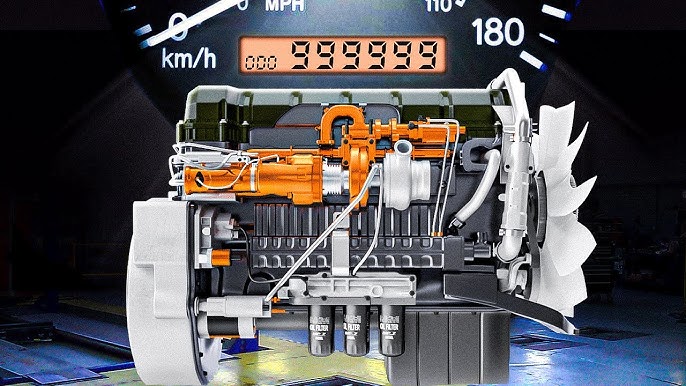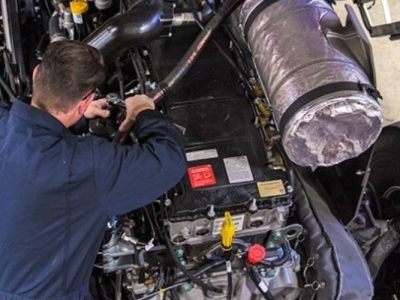Diesel engines have long been the powerhouses of the automotive world, known for their durability, efficiency, and ability to handle tough conditions. Whether in heavy-duty trucks, off-road vehicles, or commercial fleets, diesel engines have a reputation for outlasting their gasoline counterparts. But what exactly makes diesel engines more reliable than gas engines?
Here are six key reasons why diesel engines stand the test of time and why so many truck owners prefer them over gasoline-powered vehicles.
1. Diesel Engines Are Built for Longevity
One of the biggest reasons diesel engines are more reliable than gas engines is their rugged construction. Diesel engines are designed to withstand high compression ratios, which means their internal components must be stronger and more durable.
Key Differences in Construction:
- Stronger engine blocks – Diesel engines use heavy-duty materials like iron and reinforced steel to handle high compression and torque.
- Robust pistons and bearings – Diesel pistons and crankshafts are thicker and stronger to withstand higher internal pressures.
- Low RPM operation – Diesel engines operate at lower revolutions per minute (RPMs) compared to gas engines, reducing wear and tear over time.
Because of these design elements, diesel engines often outlast gas engines by hundreds of thousands of miles when properly maintained.
2. Diesel Fuel Provides Better Lubrication
Unlike gasoline, diesel fuel has natural lubricating properties, which help protect engine components from excessive wear. The fuel itself reduces friction, keeping internal parts running smoothly and extending their lifespan.
Why This Matters:
- Less wear on fuel injectors and pumps compared to gasoline engines.
- Diesel engines experience less internal friction, leading to lower maintenance costs.
- Fewer engine breakdowns over time due to reduced component stress.
Gasoline, on the other hand, is more volatile and burns hotter, leading to increased engine wear and a shorter overall lifespan.
3. Diesel Engines Have Fewer Moving Parts
A key difference between diesel and gas engines is the simpler design of diesel engines. Diesel engines rely on compression ignition, meaning they don’t require spark plugs, ignition coils, or distributors like gas engines do.
Fewer Parts = Less Maintenance
- No spark plugs or ignition system, reducing the chances of electrical failures.
- Less reliance on high-voltage ignition components that wear out over time.
- Fewer breakdowns related to ignition misfires or timing issues.
With fewer parts to wear out or fail, diesel engines often require less frequent repairs and stay on the road longer.
4. Diesel Engines Are More Fuel-Efficient
Diesel engines are far more fuel-efficient than gas engines, which not only saves money at the pump but also reduces strain on the engine. Diesel fuel contains more energy per gallon, allowing the engine to extract more power while burning less fuel.
Benefits of Diesel Fuel Efficiency:
- Fewer refueling stops, which reduces stress on the fuel system.
- Less carbon buildup, as diesel engines burn fuel more efficiently.
- Longer engine life, since efficient fuel use means less internal strain.
Over time, diesel’s superior fuel economy contributes to longer engine life and fewer maintenance issues compared to gas engines.
5. Diesel Engines Handle Heavy Loads Better
If you regularly tow heavy trailers, haul cargo, or drive off-road, a diesel engine is the superior choice. Diesel engines generate more torque at lower RPMs, making them ideal for towing and hauling without overworking the engine.
How Diesel Engines Handle Heavy Loads:
- High torque at low speeds means less strain on the engine.
- Stronger engine components handle the stress of towing better.
- Less overheating compared to gas engines when pulling heavy loads.
Gas engines, on the other hand, need higher RPMs to produce torque, which puts more strain on internal parts and leads to faster wear and tear.
6. Diesel Mechanics Are Easier to Find for Heavy-Duty Vehicles
Because diesel engines are commonly used in commercial trucks, agriculture, and construction equipment, diesel mechanics are highly skilled in maintaining and repairing them. Unlike gas engines, which may require specialized dealership services, diesel engines can often be serviced by independent diesel mechanics with extensive experience.
When your diesel truck needs maintenance or repairs, finding the best diesel mechanic ensures that your engine receives expert care and long-term reliability.
Why Diesel Mechanics Are an Advantage:
- Many independent shops specialize in diesel repairs, making service more accessible.
- Diesel mechanics are trained to extend the life of heavy-duty engines.
- Less reliance on dealership service centers, which can be costly and inconvenient.
By maintaining your diesel engine with expert diesel mechanics, you can maximize its reliability and performance for years to come.
When it comes to long-term durability and reliability, diesel engines consistently outperform gas engines. Their heavy-duty construction, better fuel efficiency, simpler design, and superior towing power make them the preferred choice for off-roaders, truck owners, and fleet operators alike.
Additionally, with fewer mechanical failures and specialized diesel mechanics available, keeping a diesel engine running strong for hundreds of thousands of miles is far easier than maintaining a gasoline-powered counterpart.
If you’re looking for an engine that delivers power, efficiency, and longevity, a diesel engine is the clear winner. And with regular maintenance from a diesel mechanic, your diesel-powered vehicle will stay on the road longer and perform at its best for years to come.








Comments